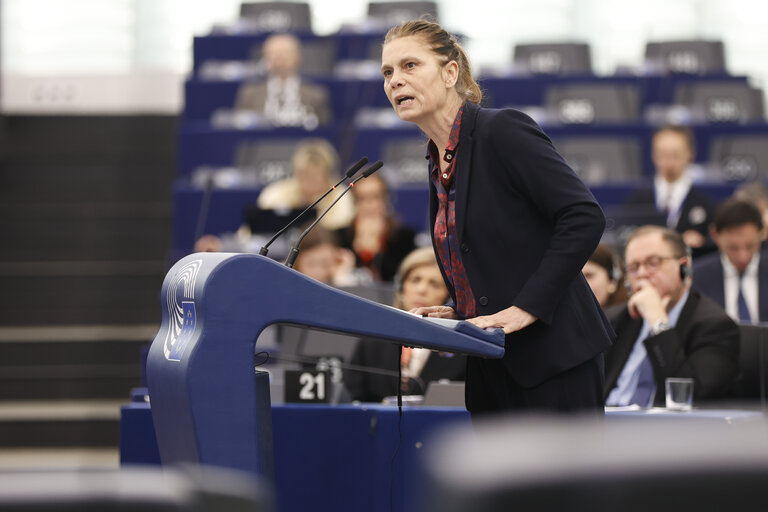
The European Parliament has outright rejected a proposal on the EU’s plan to slash the use and risk of pesticides in half by 2030 after the core of its substance was lost in the voting process – but the Council says it will still continue work on the file. So what does this mean for its future? Natasha Foote reports.
The contentious sustainable use of pesticides regulation (SUR) proposal aims to slash the use and risk of pesticides in half by 2030, as set out in the EU’s flagship food policy, the Farm to Fork strategy.
After months of back and forth, the European Parliament voted to reject outright the proposal during the plenary session in Strasbourg on Wednesday (22 November) after a concerted campaign from the right of the Parliament saw a flurry of amendments which ultimately gutted the draft text of its substance.
Most notably, the text proposed a weaker stance on national pesticide reduction targets, which would have been capped at 35%, as well as on pesticide use in sensitive areas, which sources told ARC would have offered “no protection for vulnerable human populations, nature areas, or water resources”.
Meanwhile, the resulting text also eroded financial or advisory support for integrated pest management (IPM).
A call to send the text back to the Parliament’s environment committee for reshaping was also rejected by the plenary, meaning it is effectively a dead end for the file.
‘Empty’ text
Calling it a “dark day” for both the environment and farmers and a “bitter blow” for the protection of the environment and public health, Green MEP Sarah Wiener – who led the work on the file – told journalists the news came as a shock. “I couldn’t have imagined the whole draft being trampled into the ground,” she said.
The MEP lamented the fact that there was “no willingness” to compromise between political groups, lambasting an ‘unholy alliance’ of the far-right, conservatives and liberals for joining forces to kill the entire position of the Parliament.
However, she defended the decision to vote down the final “amputated” form of the draft text completely, explaining that it would have been inadequate to give farmers the tools they needed to fulfil the EU ambitions. “It was just not a text that we could in good conscience vote for,” she said.
Likewise, leading liberal MEP Pascal Canfin – who chairs the Parliament’s environment committee – agreed that the “bar was so low” on the final “empty” text that there was no choice but to reject it.
The news was met with dismay from green campaign groups. “EU politicians have chosen a path that promises a grim and challenging future for both us and our children,” Marilda Dhaskali, EU agriculture policy officer for BirdLife Europe, said, lambasting lawmakers who opted to “uphold this disastrous system.”
Meanwhile, Clara Bourgin, agriculture campaigner at Friends of the Earth Europe, said that this vote takes the EU “back to square one with no proposal to tackle the biodiversity crisis, secure long-term food security and protect people’s health”.
Commission to Renew Glyphosate for 10 years after Member States Fail to Reach Qualified Majority
Farmers ‘not included’
However, those on the right of the Parliament, as well as in the Parliament’s agriculture committee – who shared competence on parts of the file – celebrated the outcome of the vote.
“Today is a good day for farmers and for all those who believe that the EU must hold back on new burdens in the current difficult global situation,” centre-right MEP Peter Liese said, calling the proposal “excessive” and out of touch with the reality for farmers on the ground.
For agriculture committee chair Norbert Lins, the “unprecedented” result “shows that reduction of pesticides, more sustainability, should be done with the farmers and not against them”.
This sentiment was echoed by EU farmers’ association Copa-Cogeca, who denounced the “gap between political rhetoric and the lack of concrete solutions” of this proposal.
“The lack of dialogue, the imposition of objectives from above, the refusal to assess the impact and the lack of funding for agricultural proposals must end now,” the association said in a statement.
An uncertain future
The outcome of the vote caused an uproar in the aftermath given that a rejection of a Commission proposal at the first reading without a referral back to the leading committee is exceedingly rare.
The two most likely next steps are that the EU executive chooses to withdraw its own proposal or that EU ministers decide to continue working on the file regardless of the outcome of the European Parliament’s vote.
Asked by ARC, a Commission spokesperson said that the EU executive “takes note” of the vote but declined to say whether it will now withdraw the proposal entirely.
Meanwhile, a representative for the EU Council told ARC that the EU ministers intend to “continue work” on the file.
The Spanish presidency was previously hoping for an agreement on their position in December, but the path has been rocky, with member states split on a number of key issues. Asked whether this is still the intention, the representative remained vague, saying they will “see about that”.
If the Spanish do manage to hash out an agreement on the file, its position will form the basis of another vote in the Parliament following the so-called ‘early second reading’ procedure. This requires the approval, rejection or amendment of the Council text to be approved by an absolute majority of the MEPs.
More on pesticides
SURge of Amendments to Pesticide Regulation Before Plenary Vote
Commission to Renew Glyphosate for 10 years after Member States Fail to Reach Qualified Majority
Pesticide Regulation Progresses to Plenary Following Environment Committee Vote
Agri MEPs Move to Weaken Pesticide Regulation and Starve it of CAP funds
(Don’t) Show me the Money! Agri MEPs reject Green Cash Plan for Pesticide Reduction
Beyond the Harvest: Health Effects of Pesticides on French Farmers
The True Toll of Pesticides on Rural Health – Pesticides Analysis Part 2





